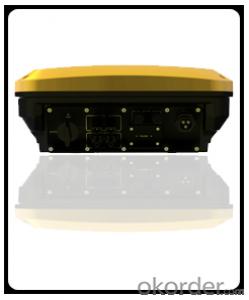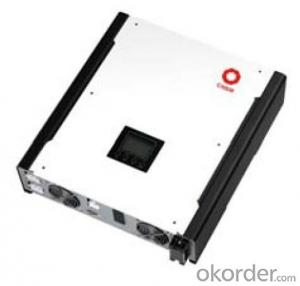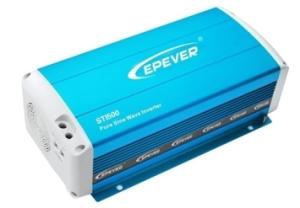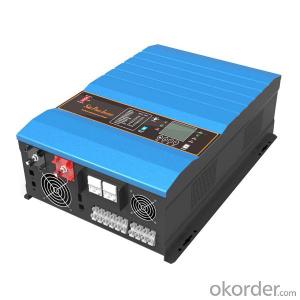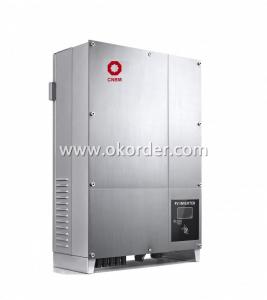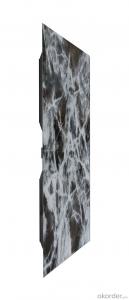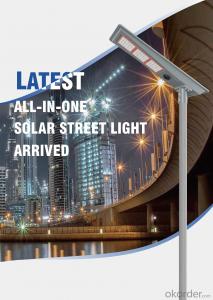Solartec 3000 on grid inverter with WIFI
- Loading Port:
- Shanghai
- Payment Terms:
- TT OR LC
- Min Order Qty:
- -
- Supply Capability:
- 10000 set/month
OKorder Service Pledge
Quality Product, Order Online Tracking, Timely Delivery
OKorder Financial Service
Credit Rating, Credit Services, Credit Purchasing
You Might Also Like
Solartec 1500,2000,2500,3000,3600,4000,4600,5000
1MPPT, single phase
IP 65
New mold with Pure thick aluminum crust.
Efficient
■ Efficiency of up to 97.6 %
■ TransformerlessSafe
■ Integrated DC switch
■ Comprehensive protection functionsFlexible
■ LCD backlight
■ For indoor and outdoor installationSimple
■ ‘Plug and play’connection for easy installation
■ Friendly interface, easy to install and maintain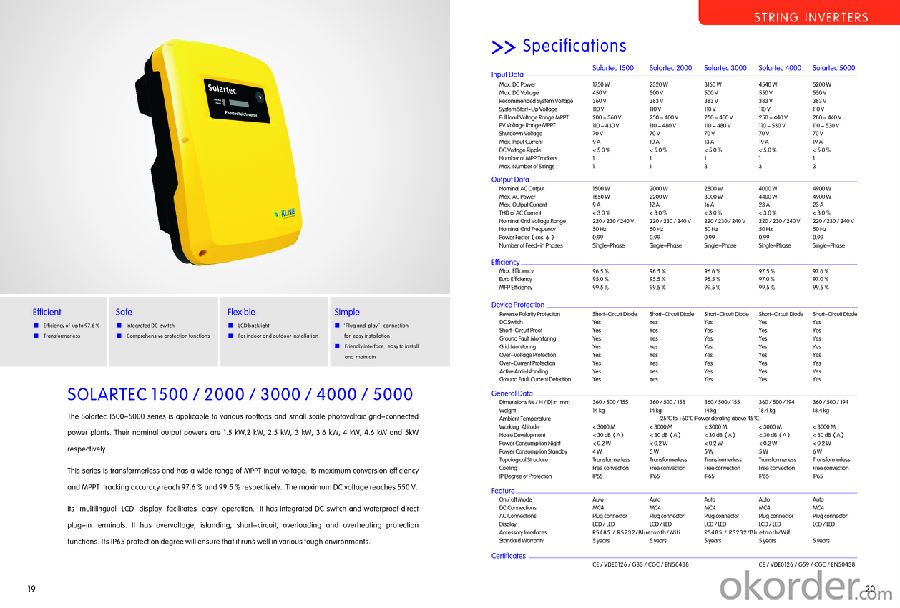
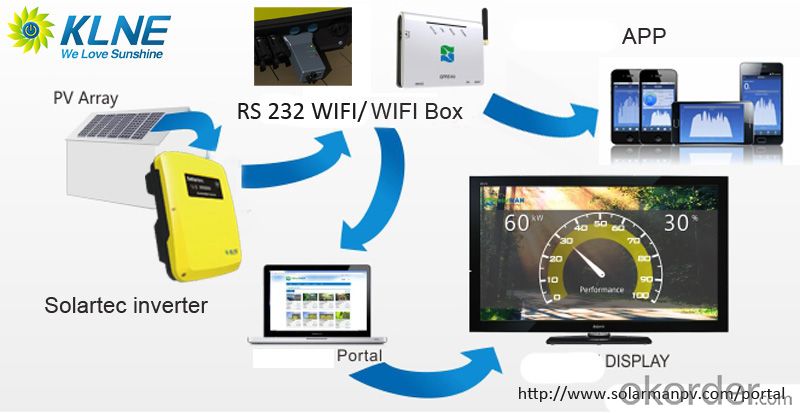
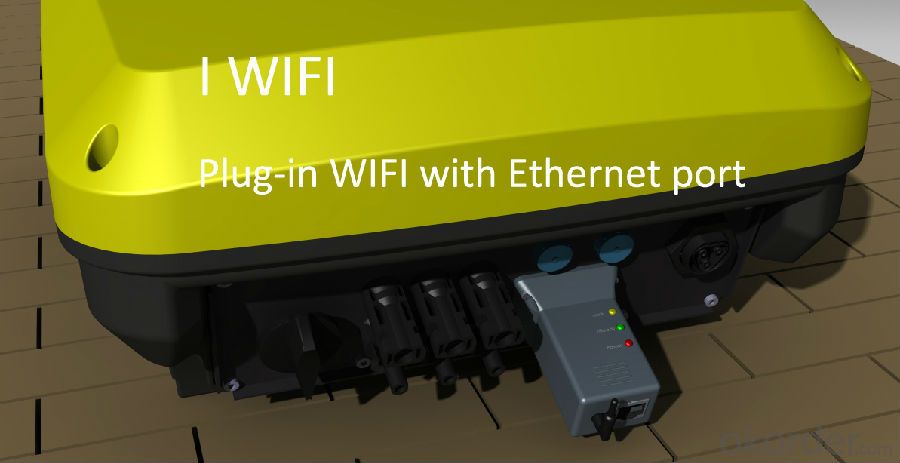
- Q:Can a solar inverter be used with a solar-powered EV charging network?
- Yes, a solar inverter can be used with a solar-powered EV charging network. A solar inverter converts the direct current (DC) generated by solar panels into alternating current (AC) that can be used to power electric vehicles (EVs). By integrating a solar inverter into a solar-powered EV charging network, the excess solar energy can be efficiently utilized to charge EVs, reducing dependence on the grid and promoting sustainable transportation.
- Q:Can a solar inverter be used with different AC voltages?
- No, a solar inverter cannot be used with different AC voltages. It is designed to convert the DC electricity generated by solar panels into a specific AC voltage, typically matching the grid voltage in the area. Using a solar inverter with a different AC voltage can result in damage to the inverter and potential safety hazards.
- Q:What is the function of a solar inverter in a solar power system?
- The function of a solar inverter in a solar power system is to convert the direct current (DC) electricity generated by the solar panels into alternating current (AC) electricity, which is the type of electricity that is used in homes and businesses. This conversion allows the solar power system to feed electricity into the grid or power household appliances directly.
- Q:Can a solar inverter be installed in a multi-storey building?
- Yes, a solar inverter can be installed in a multi-storey building. The installation of a solar inverter in a multi-storey building follows the same principles as in any other building. The solar panels are typically installed on the rooftop or any other open area where they can receive maximum sunlight. The generated DC power from the solar panels is then converted into AC power by the solar inverter. In a multi-storey building, the solar inverter can be installed either on the rooftop or in a dedicated room or space on one of the floors. The installation location should be chosen based on factors such as ease of access, ventilation, and proximity to the solar panels. It is important to ensure that the inverter is installed in a safe and secure location that complies with local building codes and regulations. Additionally, the wiring and cabling required for connecting the solar panels to the inverter should be properly installed, taking into consideration the vertical distance between the panels and the inverter. Adequate protection measures should also be taken to prevent any damage or electrical hazards during the installation process. Overall, with proper planning and installation techniques, a solar inverter can be easily installed in a multi-storey building, helping to harness solar energy and reduce electricity costs for the residents or occupants.
- Q:What is the role of a maximum power control feature in a solar inverter?
- The role of a maximum power control feature in a solar inverter is to optimize the energy output of the solar panels by constantly tracking and adjusting the operating point to ensure that the system operates at its maximum power point (MPP). This feature helps to increase the overall efficiency of the solar system and maximize the amount of energy that can be harvested from the sun.
- Q:Can a solar inverter be used in systems with different module efficiencies?
- Yes, a solar inverter can be used in systems with different module efficiencies. Solar inverters are designed to convert the DC power generated by solar panels into AC power, regardless of the module efficiency. The inverter's main function is to optimize the power conversion process and ensure compatibility between the solar panels and the electrical grid. As a result, it can accommodate varying module efficiencies and still function efficiently.
- Q:What is the warranty period for a solar inverter?
- The warranty period for a solar inverter can vary depending on the brand and model. However, it is common for solar inverters to come with a warranty period of 5 to 10 years.
- Q:Can a solar inverter be used with a single solar panel?
- Yes, a solar inverter can be used with a single solar panel. The purpose of a solar inverter is to convert the direct current (DC) produced by the solar panel into alternating current (AC) that can be used to power electrical devices or be fed back into the grid. Whether you have one solar panel or multiple panels, a solar inverter is necessary to convert the DC electricity into usable AC electricity.
- Q:What are the common troubleshooting steps for a malfunctioning solar inverter?
- The common troubleshooting steps for a malfunctioning solar inverter include checking the display for error messages, inspecting the DC and AC connections for loose or damaged wires, verifying the input voltage and frequency, resetting the inverter, and monitoring the system for any unusual behavior. If these steps do not resolve the issue, it is advisable to consult a professional or contact the manufacturer for further assistance.
- Q:Can a solar inverter be used in a commercial solar system?
- Yes, a solar inverter can be used in a commercial solar system. In fact, it is an essential component as it converts the direct current (DC) generated by the solar panels into alternating current (AC) that can be used to power commercial buildings and equipment. The solar inverter ensures efficient and reliable energy conversion, making it suitable for both residential and commercial solar installations.
1. Manufacturer Overview |
|
|---|---|
| Location | |
| Year Established | |
| Annual Output Value | |
| Main Markets | |
| Company Certifications | |
2. Manufacturer Certificates |
|
|---|---|
| a) Certification Name | |
| Range | |
| Reference | |
| Validity Period | |
3. Manufacturer Capability |
|
|---|---|
| a)Trade Capacity | |
| Nearest Port | |
| Export Percentage | |
| No.of Employees in Trade Department | |
| Language Spoken: | |
| b)Factory Information | |
| Factory Size: | |
| No. of Production Lines | |
| Contract Manufacturing | |
| Product Price Range | |
Send your message to us
Solartec 3000 on grid inverter with WIFI
- Loading Port:
- Shanghai
- Payment Terms:
- TT OR LC
- Min Order Qty:
- -
- Supply Capability:
- 10000 set/month
OKorder Service Pledge
Quality Product, Order Online Tracking, Timely Delivery
OKorder Financial Service
Credit Rating, Credit Services, Credit Purchasing
Similar products
New products
Hot products
Hot Searches
Related keywords

